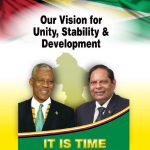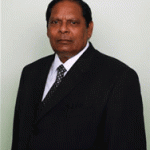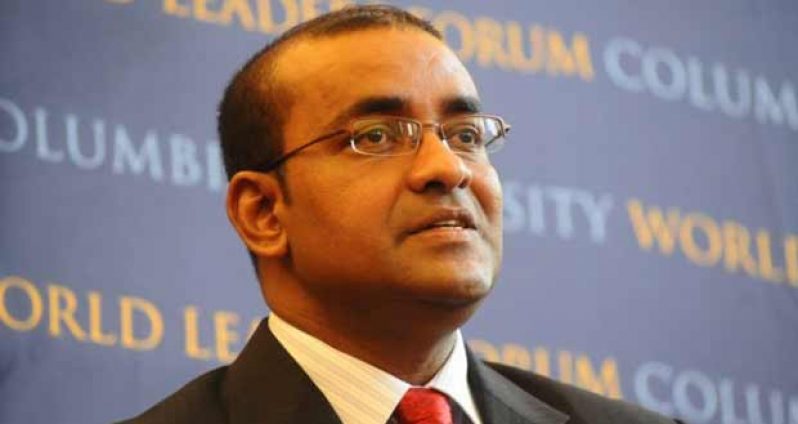DEVIATING from the tradition of past years, the alliance of A Partnership for National Unity and the Alliance For Change (APNU+AFC) late last night made its Manifesto public via the Internet.And in a statement, former president Dr Bharrat Jagdeo dismantled the details of the 46-page pact that the alliance seeks to make with the Guyanese people.

“The APNU+AFC manifesto is unimaginative, perfunctory, has no strategic clarity and it is sometimes contradictory in its policy prescriptions,” he said, adding: “Some of their promises are outright preposterous, and an insult to the intelligence of the Guyanese people.”
The APNU+AFC plan has as its central themes: Healing and reconciliation; Governance; Constitutional Reform; Public Safety and Security; Women and Gender Equality; Youth Policy; Education; Health and Nutrition; Housing Policy; Sports and Recreation; Cultural Policy; Natural Resources and the Environment; Agriculture; Hinterland Development; Tourism; Information & Communication Technology; Income Distribution; and Foreign Relations.
The highlights of the promises made are: The reduction of several forms of taxation, including the Value Added Tax (VAT); an eventual increase of the personal income tax threshold to $100,000; a 10 per cent increase to all public servants as a means to entice labour unions back into the collective bargaining arrangement; and a seven per cent rate of annual economic growth.
The alliance is also proposing that: All new public servants will be trained and pass examination of competence before being retained; constitutional reform that outlines new measures under which persons are elected to the executive and how power is shared; and a dedicated policy for Region 10, with Linden touted as a “secondary administrative” centre of Guyana.
100-DAY PLAN
In a bid to gain the confidence of the Guyanese people, APNU+AFC proposes a 14-point plan, namely the Foundations for Development, which recognises the need for a stronger private sector-led economy, less crime, equal opportunity, political reform and youth, among other areas.
“It must be emphasised that these foundations are all equally important and must be implemented simultaneously,” the Manifesto said.

On this basis, the alliance has committed to several other undertakings during its term in office, including: The introduction of a meaningful constitutional reform programme geared toward improved governance and fair representation; the sustained improvement of crime prevention and the security environment; local government reforms and the holding of Local Government Elections; the establishment of the Public Procurement Commission (PPC) and the passage of the Anti-Money Laundering legislation, as well as a comprehensive review of the current taxation policies; the reorganisation of the education, health, sports and recreation sectors for better service and outcome; a review and restructure of the media and telecommunications sector; the introduction of a youth programme; and a programme for healing and reconciliation.
Given these commitments, the Manifesto states that an APNU+AFC administration will, in its first 100 days in office, address the:
* Establishment of a constitutional reform committee with a mandate to complete consultations, draft amendments and present these to the National Assembly for approval within nine months;
* Liberalisation of the telecommunications and Information Communication and Technology (ICT) sectors;
* Announcement of a date for local government elections;
* Development and implementation of a sustained national crime- prevention plan;
* Establishment of the Public Procurement Commission (PPC);
* The implementation of an amended Anti-Money Laundering and Countering the Financing of Terrorism (AML/CFT) Act; and
* The adoption of a long-term sustainable economic development plan to realise the vast potential of Guyana.
AD HOC

The latter, in particular, caught the attention of Dr. Jagdeo, who contends that the promise to develop an economic plan is telling.
He said, “What is particularly revealing is their proposal to develop a long-term economic plan within the first 100 days if they win the elections. How can they say they have a plan to develop the country and at the same time promise to write one if they win the elections? This is just one of the many instances of deceit and contradiction in the manifesto.”
The former president added: “In my estimation, 75% is arbitrary, ad hoc extraction of policies that the PPP/C is already pursuing, but without the strategic framework that our government has outlined in several public documents including the NDS, PRSP, NCS, LCDS and our five-year education plan. Because of the absence of this framework, the APNU+AFC manifesto lacks focus.”
He highlighted the fact that several of the promised undertakings are already being advanced by the ruling People’s Progressive Party/ Civic (PPP/C) Administration.
“For example, on Page 12 it states: ‘Ministers and senior government officials will be required to declare their assets.’ This is already in the Integrity Commission Act, and is being complied with by members of the PPP/C Cabinet. The only people refusing to submit their statements of income and assets are some Opposition Leaders and some of their Members of Parliament,” he said.
The alliance, in its manifesto, is confident that a “unity government” will succeed because of its commitment to the ideal of a good life for all Guyanese.
However, Dr. Jagdeo’s rejoinder is clear. “This manifesto is also a confirmation of what has been said over the past weeks; the Opposition is notorious for being against things – Amaila Hydropower, Airport expansion, the Marriott Hotel, the Specialty Hospital, the Amerindian Development Fund and UG students’ loans, among others. They are notorious for opposing things, but are visionless and weak in outlining policies needed to improve the lives of our people.”
In the 46-page document, the alliance also outlines the framework under which the Cummingsburg Accord will be realised. “The principal objective of the political system of the State is to establish an inclusionary democracy by providing increasing opportunities for the participation of citizens and their organisations in the management and decision- making process of the State,” the document said.



.jpg)










